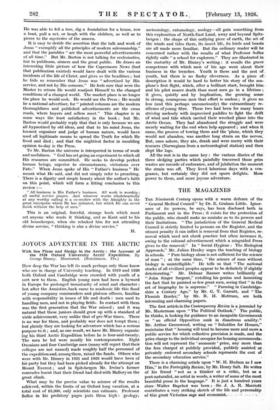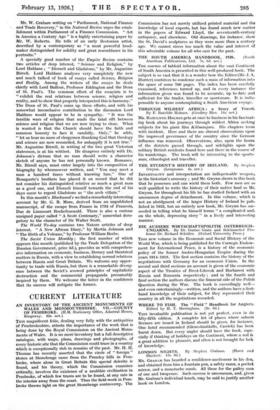THE MAGAZINES
THE Ninete,enth Century opens with a warm defence of the "General Medical Council" by Dr. E. Graham Little. Ignor- ance of its powers, he says, has been disclosed both in Parliament and in the Press ; it exists for the protection a the public, who should make no mistake as to its powers and their limitations. "-The jurisdiction of the General Medical Council is strictly limited to persons on the Register, and the- utmost penalty it can inflict is removal from that Register, re- moval which need not check practice but often increases it, owing to the colossal advertisement which a misguided Press gives to the removal." In "Social Hygiene : The Biological Approach," Mr. Julian Huxley. urges the teaching of biology- in schools. "Pure biology alone is not sufficient for the science- of man " ; at the same time, "the science of man without- biology is unintelligible." He tells us that "The national stocks of all civilized peoples appear to be definitely if slightly deteriorating." Mr. Delmar Banner writes brilliantly of "John Singer Sargent," extolling his genius and lamenting the fact that he painted so few great men, seeing that " in the art of biography he is supreme." "Farming in Cambridge- shire a Century Ago," by Mr. G. T. Garrett, and "The Flemish Border," by Mr. R. H. Mottram, are both interesting and charming papers.
The first article in the Contemporary Review is a jeremiad by Mr. Masterman upon "The Political Outlook." The public, he thinks, is looking for guidance to an incapable Government or "an official Opposition sunk in disastrous senility."- Mr. Arthur Greenwood, writing on "Subsidies for Houses," maintains that " housing will tend to become more and more a public service for which collective provision is made, and the price charge to the individual occupier for housing accommoda- tion will not represent the ' economic ' price, any more than the fees: charged at publicly provided, publicly assisted ar privately- endowed secondary schools represents the cost of the secondary education service."
There is a charming article upon "W. H. Hudson as I saw Him," in the Fortnightly Review, by Mr. Henry Salt. He writes of his friend "not as a thinker or a critic, but as a poet-naturalist, an artist in words, a writer of some of the most beautiful prose in the language." - It is just a hundred years sinee - Walter Bagehot was born ;- - Sir. J. A. R. Marriott contributes a very striking sketch of the life and personality of this great- Victorian -sage and economist... - . _
Mr. W. Graham writing on "Parliament, National Finance and Trade Recovery," in the National Review urges the estab- lishment within Parliament of a Finance Commission. "Are in America a Century Ago" is a highly entertaining paper by Mr. W. Roberts. He tells of an early Bostonian artist, described by a contemporary as "a most powerful head- maker distinguished for solidity and great resemblance in his portraits."
A specially good number of the Empire Review contains two articles of deep interest, "Science and Religion," by Lord Haldane ; "Disraeli and Gladstone," by Mr. Augustine Birrell. Lord Haldane analyses very completely the new and much talked of book of essays called Science, Religion and Reality. Among the writers of the essays he deals chiefly with Lord Balfour, Professor Eddington and the Dean of St. Paul's. The common effort of the essayists is to "exhibit the real relations between science, religion and reality, and to show that properly interpreted this is harmony." The Dean of St. Paul's sums up these efforts, and with his somewhat inconclusive contribution to the discussion Lord Haldane would appear to be in sympathy. "It was the terrible wars of religion that made the fatal rift between science and religion that we are now trying to close. What is wanted is that the Church should have the faith and common honesty to face it candidly. Only," he adds, "let us hear no more of clergymen thanking God that theology and science are now reconciled, for unhappily it is not true." Mr. Augustine Birrell, in writing of the two great Victorian statesmen, is at his wittiest. He disagrees entirely with Dr. Johnson's dictum that no man should write a character sketch of anyone he has not personally known. Romance, Mr. Birrell says, must enter largely into the composition of biography by whomsoever written, and "You may meet a man a hundred times without knowing him." One of Bonaparte's brothers has placed it on record that he did not consider his distinguished relative so much a great man as a good one, and Disraeli himself towards the end of his days came to regard Gladstone as "the arch villain."
In this mouth's Blacicwood's we find a remarkably interesting account by Mr. G. B. Mure, derived from an unpublished manuscript, of the escape from France in 1792 of Francois, Due de Liancourt Rochefoucauld. There is also a curious unsigned paper called "A Scott Centenary," somewhat dero- gatory to the character of Sir Walter Scott.
The World To-day contains two Nature articles of deep interest. "A New African Diary," by Martin Johnson and "The Birth of a Volcano," by Professor William Beebe.
The Soviet Union Monthly ; the first number of which appears this month (published by the Trade Delegation of the Russian Government, price 3d.), provides us with comprehen- sive information on economic, business, literary and theatrical matters in Russia, with a view to establishing normal relations between Russia and Great Britain. We welcome any oppor- tunity to trade with Russia, but there is a remarkable diverg- ence between the Soviet's avowed principles of capitalistic destruction and the commercial propaganda presumably inspired by them. We welcome the latter in the confidence that its success will mitigate the former.



















































 Previous page
Previous page